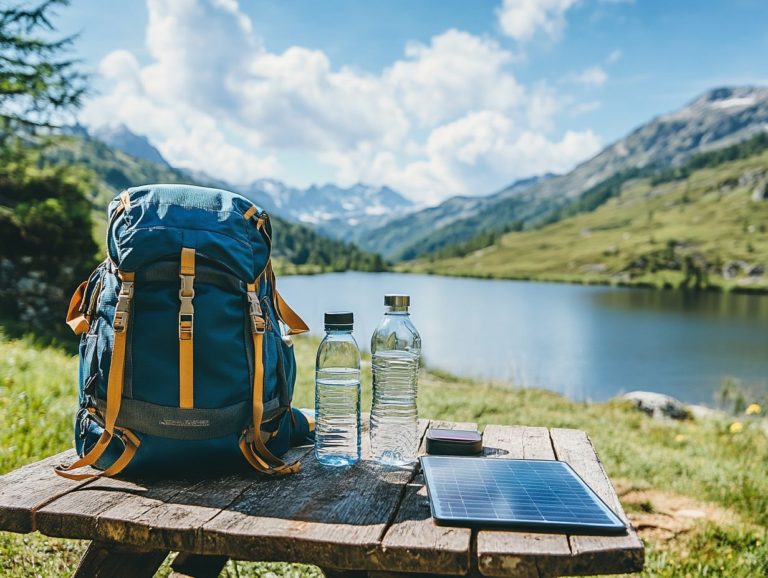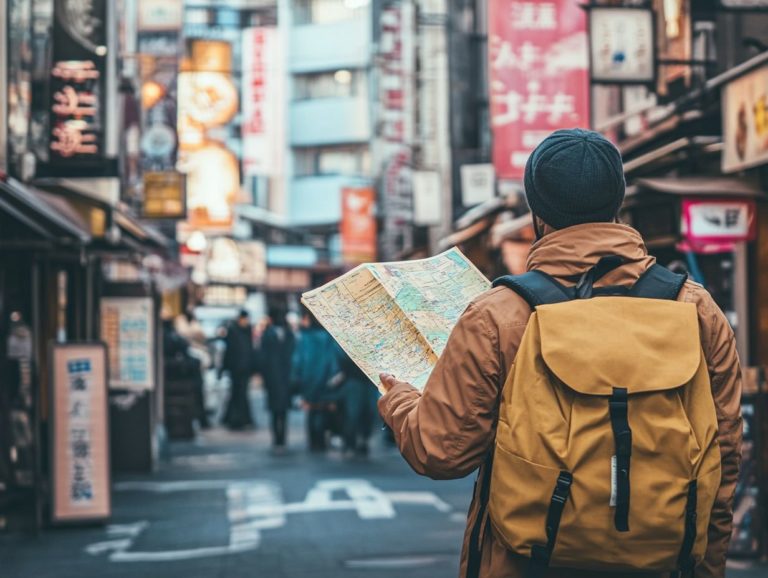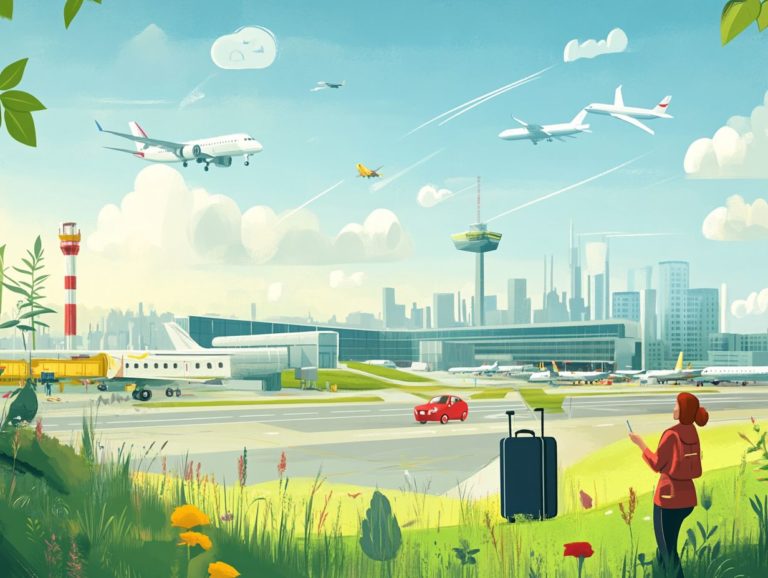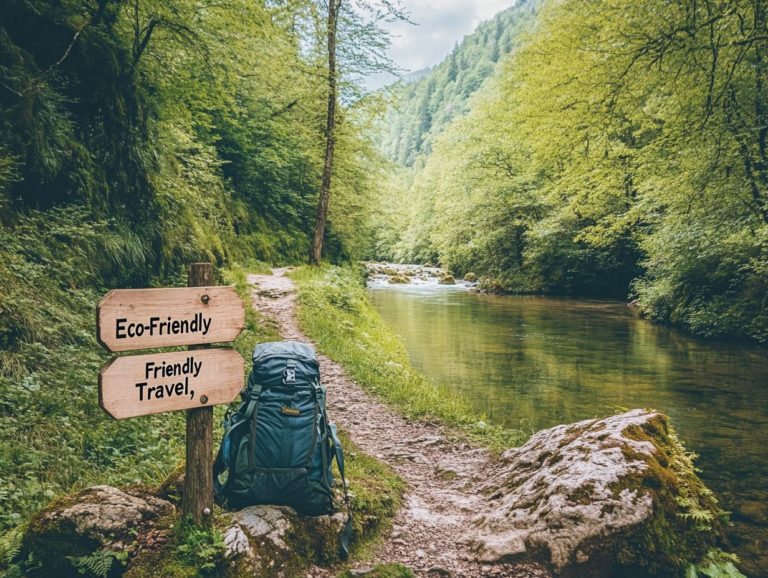The Role of Travel in Environmental Conservation
Travel presents a magnificent opportunity to explore the world, yet it also carries considerable environmental responsibilities.
Understanding your impact on the planet is essential, particularly since various types of travel, especially sustainable travel and eco-friendly tourism, can leave differing ecological footprints.
This discussion delves into the significance of environmental conservation in the context of travel. It emphasizes the advantages of sustainable practices, offers practical tips for responsible travel, and showcases inspiring examples of successful initiatives.
Discover how you can relish your journeys while safeguarding the beautiful places you cherish.
Contents
- Key Takeaways:
- The Importance of Environmental Conservation
- How Travel Affects the Environment
- The Benefits of Sustainable Travel
- Ways to Be a More Responsible Traveler
- Examples of Sustainable Travel Practices
- How to Incorporate Environmental Conservation into Your Travels
- Common Questions About Travel and Conservation
- What is the role of travel in environmental conservation?
- How does travel contribute to environmental conservation?
- What are some examples of sustainable travel practices?
- What are some negative impacts of travel on the environment?
- How can travelers reduce their environmental impact?
- What are some ways that travel companies and organizations can promote environmental conservation?
Key Takeaways:
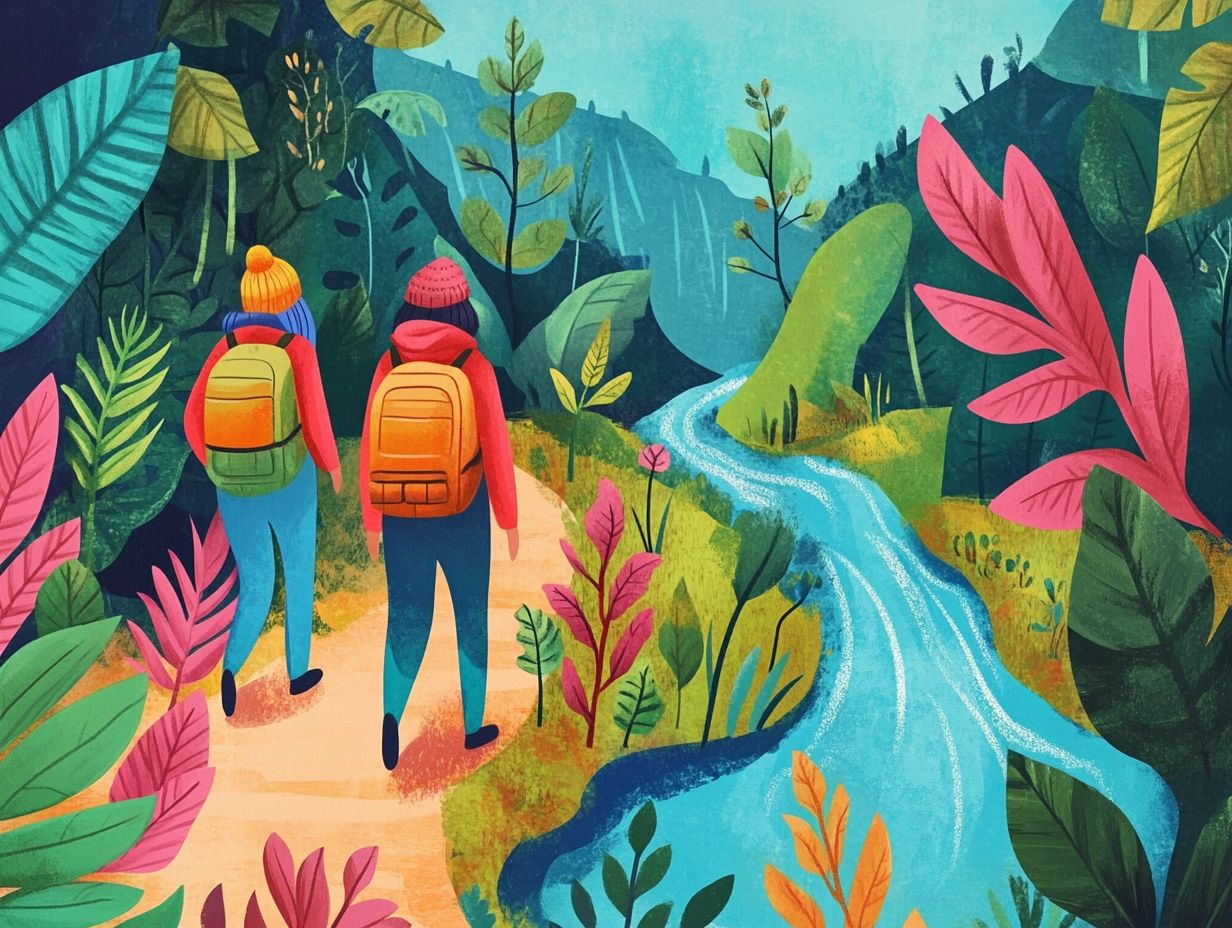
- Travel can have a significant impact on the environment. By being responsible and making sustainable choices, we can help preserve and protect our natural resources.
- Sustainable travel benefits the environment and supports local communities while promoting conservation efforts.
- Participating in conservation projects and volunteering can make a positive impact on the places we visit, creating meaningful experiences.
The Importance of Environmental Conservation
Environmental conservation is immensely important in today s world. It directly impacts the sustainability of our planet and its rich ecosystems.
When you partake in sustainable travel and eco-friendly tourism, your actions can significantly contribute to or undermine the environmental sustainability of the regions you explore.
This duality becomes particularly pronounced in iconic destinations like Costa Rica, Venice, and Machu Picchu. Here, the interplay between tourism and conservation is both delicate and crucial.
Understanding Our Impact on the Environment in a Climate Change Context
Understanding your impact on the environment is essential for cultivating a culture of sustainable practices that minimize your carbon footprint the total amount of greenhouse gases we produce and promote environmental sustainability.
This awareness encourages you to scrutinize your habits, especially regarding how you consume resources and produce waste.
The choices you make in your daily life, from the products you select to the energy you utilize, can either deplete natural resources or contribute positively to the planet s well-being.
In this light, embracing biodegradable products items that can break down naturally and renewable energy sources is vital, especially in eco-friendly tourism.
This approach can transform your travels into unforgettable adventures that protect our planet while ensuring you respect and preserve the destinations you explore for future generations.
How Travel Affects the Environment
Travel significantly impacts the environment. Grasping these effects is essential for fostering eco-friendly tourism and reducing your carbon footprint.
The choice of transportation, whether you opt for public transit or direct flights, can greatly shape your ecological footprint.
Wildlife tourism can either help conservation efforts or harm the environment. Understanding these dynamics gives you the power to make informed choices that align with sustainable travel practices.
Environmental Impact of Different Types of Travel
The environmental impact of various travel options can differ greatly. Sustainable travel practices and eco-friendly accommodations play pivotal roles in reducing your carbon footprint.
When weighing your travel choices, remember that flying tends to rack up the highest carbon emissions per passenger mile compared to alternatives.
Driving may be a more eco-friendly option, especially if you re behind the wheel of an electric vehicle or carpooling. On the other hand, public transit shines with its efficiency and lower emissions per person.
If you re looking to minimize your impact, consider staying at eco-conscious lodges that prioritize renewable energy, water conservation, and local food sourcing.
Additionally, adopting practices like carbon offsetting and opting for local experiences can significantly enhance your responsible travel efforts. This ensures that your adventures don t come at the expense of our planet.
Join the movement for sustainable travel today!
In conclusion, sustainable travel is essential for protecting our planet and its diverse ecosystems. Reflect on your travel choices and consider how you can make a positive impact wherever you go.
The Benefits of Sustainable Travel

Sustainable travel presents a wealth of benefits that go far beyond personal enjoyment. It nurtures eco-friendly tourism, champions social sustainability, and bolsters local economies. This creates a positive ripple effect on communities and ecosystems.
By embracing conservation travel, you transform into an active participant in preserving the very destinations you explore.
Promoting Conservation and Supporting Local Communities
Promoting conservation while supporting local communities is essential for sustainable travel. By respecting cultural values and fostering community growth, you create a balanced and enriching tourism experience.
Engaging in activities that involve observing and supporting wildlife allows you to protect endangered species while uplifting local populations. For example, choosing eco-lodges that hire local guides for wildlife tours not only supports conservation efforts but also provides families with a reliable source of income.
Programs that involve community decision-making ensure that initiatives address local needs and help preserve cultural heritage.
Join responsible activities like wildlife safaris that contribute to habitat protection or marine tours that support coral reef restoration. You can sustain biodiversity while enjoying genuine interactions that celebrate and honor local traditions.
Ways to Be a More Responsible Traveler
To become a more responsible traveler, embrace practices that prioritize minimizing waste, utilizing renewable energy, and selecting eco-friendly accommodations. Incorporating valuable travel tips enhances your overall experience while ensuring you respect the environment.
Practical Tips for Reducing Your Environmental Footprint
Try these practical tips to reduce your environmental footprint while traveling. Simple actions like minimizing waste, using biodegradable products, and adopting sustainable practices can truly make a difference.
Start by packing reusable items like water bottles and cutlery to cut down on single-use plastics. Choose eco-friendly toiletries; biodegradable soap and shampoo bars keep harmful chemicals out of local ecosystems and lighten your travel bag.
Research local recycling options and seek accommodations that prioritize sustainability. Support environmentally conscious businesses. When exploring, consider using public transportation or biking; it s a great way to reduce carbon emissions while enjoying the sights.
These small adjustments can collectively lead to a more sustainable journey, making you a responsible traveler who champions both environmental and social sustainability.
Examples of Sustainable Travel Practices
Examples of sustainable travel practices showcase innovative initiatives that place a premium on conservation and foster eco-friendly tourism. By embracing these practices, you enhance your travel experience and support local businesses and communities, ensuring your adventures contribute positively to the destinations you explore.
Innovative Initiatives and Success Stories

Innovative initiatives in sustainable practices unveil success stories that drive conservation travel. Wildlife tourism serves as a powerful avenue for fostering community growth and promoting economic sustainability.
Take, for instance, the eco-lodges in Madagascar. They’ve rolled out programs that actively involve local communities in protecting unique species like the lemur, while generating economic benefits through responsible tourism. This approach helps preserve biodiversity and cultivates a sense of ownership among locals.
In a similar vein, Costa Rica exemplifies how collaborative efforts between tour operators and indigenous peoples enhance cultural heritage while bolstering conservation initiatives. These narratives underscore the essential role responsible tourism plays in benefiting wildlife, creating jobs, and ensuring local ecosystems thrive for generations to come, as highlighted in discussions about the benefits of eco-conscious travel.
How to Incorporate Environmental Conservation into Your Travels
Incorporating environmental conservation into your travels is entirely achievable by engaging in volunteering and conservation projects. These endeavors honor local cultures while promoting responsible tourism.
By committing to sustainable travel practices, you elevate your travel experience and contribute positively to the destinations you explore.
Volunteering and Participating in Conservation Projects
Volunteering and engaging in conservation projects enhance community growth and create long-lasting benefits for wildlife tourism and environmental sustainability.
These initiatives provide a unique opportunity to actively participate in preserving diverse ecosystems while supporting local economies. For example, by volunteering in turtle conservation programs, you play a crucial role in protecting nesting sites and ensuring the survival of these endangered species. Additionally, understanding the role of wildlife sanctuaries in sustainable travel can further enhance your impact.
Programs focused on reforestation often require you to plant native trees, essential for restoring habitats and combating climate change. The transformative effects of these projects empower local communities by offering job opportunities and education.
This reinforces the significance of responsible tourism, prioritizing both environmental and social well-being.
Common Questions About Travel and Conservation
What is the role of travel in environmental conservation?
The role of travel in environmental conservation refers to the impact that travel and tourism have on the environment and its potential as a tool to protect and preserve natural resources.
How does travel contribute to environmental conservation?
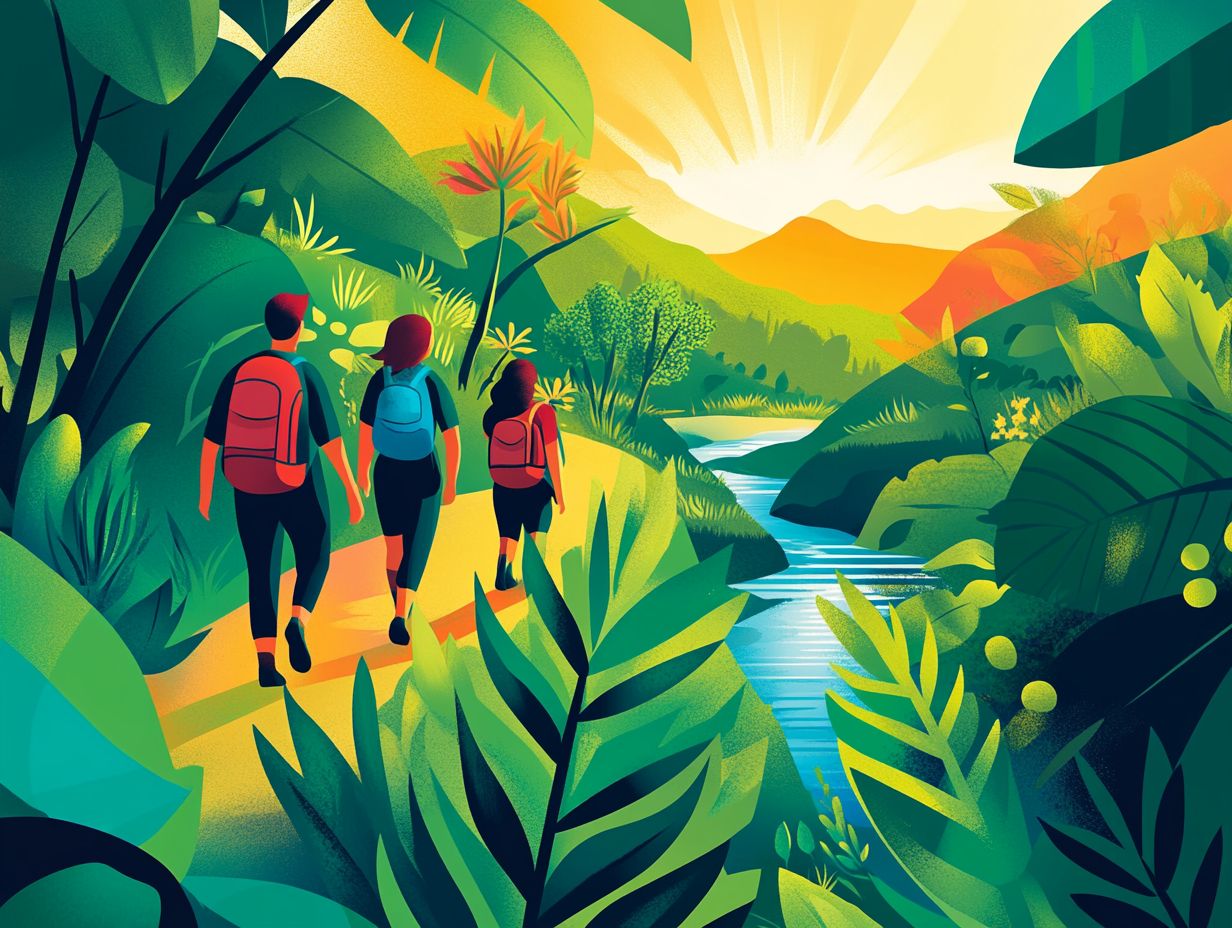
Travel contributes to environmental conservation by providing financial support for conservation efforts, raising awareness about environmental issues, and promoting sustainable practices, such as eco-friendly travel.
What are some examples of sustainable travel practices?
Examples of sustainable travel practices include minimizing single-use plastics, supporting local and eco-friendly accommodations, choosing environmentally-friendly transportation options, and participating in eco-tourism activities that positively impact the environment.
What are some negative impacts of travel on the environment?
Travel can negatively impact the environment through air and water pollution, destruction of natural habitats, and carbon emissions. These effects contribute to climate change and harm local ecosystems and wildlife.
How can travelers reduce their environmental impact?
Travelers can reduce their environmental impact by practicing responsible and sustainable travel habits, such as choosing eco-friendly accommodations, participating in conservation activities, using public transportation or eco-friendly modes of transport, and minimizing waste and energy consumption.
What are some ways that travel companies and organizations can promote environmental conservation?
Travel companies and organizations can promote environmental conservation by implementing sustainable practices, supporting local conservation efforts, educating travelers, and collaborating with local communities and environmental groups to protect natural resources and wildlife.
Join the movement! Start your sustainable travel journey today.


